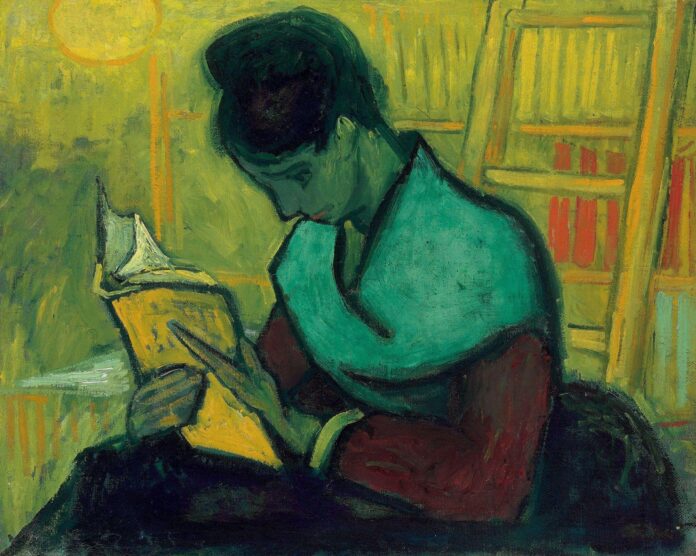A federal judge in US District Court in Detroit has asked parties in a lawsuit over the possession of a Vincent van Gogh painting to settle the matter themselves. The artwork, Une liseuse de romans (The Novel Reader, 1888), is currently on loan to the Detroit Institute of Art (DIA). The museum was sued last week by Brazilian collector Gustavo Soter, who claims that he is its rightful owner. The museum’s attorneys said the DIA exercised due diligence to ensure the painting was not stolen and that under federal law, the court cannot tell museum officials what to do with it.
The museum is “blameless in this case”, US District Judge George Caram Steeh said, according to WXYZ Detroit. He added that he could find little legal precedent for the case.
The painting, a scene of a woman reading, has been on view at the DIA since 2 October 2022 as part of the museum’s blockbuster exhibition Van Gogh in America (until 22 January), which features 74 paintings drawn from the DIA’s collection and more than 60 lenders. The wall label next to The Novel Reader notes that the painting comes from a private collection in São Paulo.
Debate over its provenance emerged in the exhibition’s closing weeks, when Soter’s Miami-based art brokerage company, Brokerarte Capital Partners, filed suit on 10 January seeking to recover the painting. According to the suit, Soter purchased it in 2017 for $3.7m from Torrealba Holdings, a company owned by Brazilian thoroughbred horse breeding investor Goncalo Borges Torrealba. Soter then transferred the painting to an unidentified third party while retaining title to it. Soter estimates that The Novel Reader is now worth more than $5m.
“This party absconded with the painting, and Plaintiff has been unaware of its whereabouts for years,” Brokerarte Capital’s lawyers wrote, adding that Soter learned only recently that the work was on loan to the DIA. “The painting was unlawfully taken from plaintiff and is currently being unlawfully detained by the DIA,” the complaint reads. On Thursday (19 January), Brokerarte Capital’s attorney added that it was supposed to be in storage in Brazil for future sale.
The complaint sought to recover the painting and requested a temporary restraining order preventing the DIA from moving the work, arguing that Soter would lose his shot at ending his years-long search for it once Van Gogh in America closes on 22 January.
A district judge granted the order on 11 January to prevent the DIA from moving the Van Gogh. In response, the museum called for the dismissal of the complaint. Attorneys for the DIA cited a federal law from 1965 that protects the painting from seizure or other judicial processes on the basis that it is an “object of cultural significance” imported for temporary display. The State Department granted immunity to The Novel Reader, in addition to 26 other works in the Van Gogh exhibition, in July 2022.
Litigating the dispute would violate the law, known as the Immunity from Seizure Act, and potentially lead to a chilling effect, according to the museum’s attorney Andrew Pauwels. “The DIA and other US cultural institutions would suffer substantial harm,” he wrote. “The maintenance of this lawsuit would threaten the ability of US art museums to assemble world-renowned exhibitions, such as Van Gogh in America, likely chilling the willingness of foreign lenders to lend works of art to US institutions.
“Congress enacted the Immunity from Seizure Act precisely to avoid this substantial risk to the DIA and other U.S. art museums.”
The DIA has not been accused of misconduct or wrongdoing in the dispute. Prior to applying for immunity, it confirmed that the work had not been reported as lost or stolen on either the FBI’s National Stolen Art File or the Art Loss Register—the world’s largest database of stolen art. “The Detroit Institute of Arts certifies that it has undertaken professional inquiry—including independent, multi-source research—into the provenance of the objects proposed for determinations of cultural significance and national interest,” a museum registrar wrote in the DIA’s application for immunity in May 2022.
Ahead of Thursday’s hearing, Brokerarte Capital’s lawyers argued that the Immunity from Seizure Act does not apply to this painting because the Act prohibits non-owners from seizing works of art from owners. “The Immunity from Seizure Act does not bar this Court from returning to Plaintiff what already belongs to it,” they wrote.
Steeh will issue a written ruling should the parties fail to come to an agreement. “I would encourage the attorneys here to address the possibility of resolving the dispute that will avoid the court’s ultimate ruling,” he said.

























